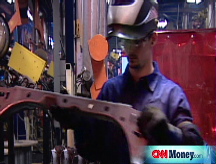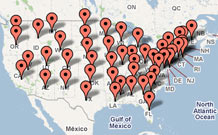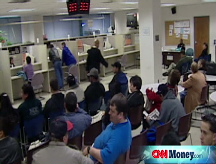Accord on U.S. help for automakers
GM and Chrysler are close to getting billions in stopgap aid to stay out of bankruptcy. Pelosi changes mind on key sticking point.
NEW YORK (CNNMoney.com) -- Congressional Democrats and the Bush White House have reached an agreement in principle on providing stopgap support for the U.S. auto industry, according to congressional and industry sources.
The deal would keep the most troubled companies out of bankruptcy court at least through the end of March. While the money is less than the automakers were asking for in testimony before Congress this week, the package is designed to keep them operating so that the new Congress and the Obama administration will have at least a couple of months to draft and pass a longer-term solution.
The break came Friday evening when House Speaker Nancy Pelosi, D-Calif., backed off her opposition to using funds from a fuel efficiency research program for a bailout, two congressional officials told CNN Friday.
A congressional source stressed that the agreement does not represent a final bill. Talks on all side are expected to continue through the weekend, and lawmakers will convene early in the week.
"We hope to continue to make progress toward assistance for the automakers based on important principles -- that taxpayer assistance only be considered for companies willing to make the difficult decisions across the scope of their businesses to be viable and competitive in the future; that taxpayer assistance should come from funds already appropriated in the program specifically intended to assist automakers -- the auto loan program; and that assistance is accompanied by very strong taxpayer protections," Pelosi said in a statement released Saturday.
An auto industry source told CNNMoney.com that it was too early to say there is a firm deal, but that the change of heart by Pelosi on the source of funds for a bailout was a significant step towards reaching an agreement.
In another significant sign of the improved chances for the bailout, both Pelosi and Senate Majority Leader Harry Reid, D-Nev., issued statements saying they expected to call the lame duck Congress back into session for a vote on help for the auto industry.
As recently as Thursday, neither Pelosi nor Reid would commit to holding the vote the automakers say they need in the coming two weeks.
But the leaders decided Friday to plan for a vote in the wake of the government's grim employment report, which showed that the economy lost 533,000 jobs in November, and the better reception the automakers' CEOs received on Capitol Hill at hearings on Thursday and Friday.
"Today's announcement of major job losses and findings from congressional hearings from the last two days make it clear that Congress must work on a bipartisan basis to provide short-term and limited assistance to the automobile industry while it undertakes major restructuring," said Pelosi.
Automakers took the announcement of a vote as a positive sign.
"The U.S. auto industry is a critical part of our economy and we are encouraged by Speaker Pelosi's statement that Congress is expected to act next week," Ford Motor (F, Fortune 500) said in a statement late Friday.
Congressional Republicans and President Bush support the idea of tapping a $25 billion research fund Congress has already approved. Two officials familiar with the compromise talks told CNN that the working target is $15 billion to $17 billion in bridge loans.
General Motors (GM, Fortune 500), the nation's largest automaker, has warned that it will run out of cash to operate by the end of the year without federal assistance. And Chrysler LLC has indicated it also is close to running out of money and will not get through the first quarter of the year without help.
GM and Chrysler have argued that consumers would be reluctant to buy cars from a bankrupt automaker. As a result, they say, bankruptcy filings would force them to go out of business and liquidate their assets.
While the industry requested $34 billion in federal loans this week from Congress to help them weather the current cash crisis sparked by the worst auto sales in 26 years, their top executives indicated in testimony Friday that they could get by with the lesser amount in order to make it through March.
GM Chief Executive Rick Wagoner said the company needs $4 billion by the end of the year to avoid bankruptcy, another $4 billion in January and an additional $2 billion by the end of March. Overall, GM is seeking up to $18 billion to get to 2010, when cost savings from a 2007 labor contract will kick in.
Chrysler CEO Robert Nardelli indicated his company needed $4 billion early next year out of the total of $7 billion it is asking for from Congress.
Ford, the third major U.S. automaker, has far more cash on hand and believes it will not need federal loans in order to survive. But it is asking for access to up to $9 billion in loans as a "backstop" in case business conditions are worse than its executives forecast next year.
Congressional officials cautioned that talks are still very fluid, and that there are still other options on the table and many details to discuss.
Pelosi said that Congress was "considering various short-term funding options," but added that no funds would be released from the research program "unless there is a guarantee that those funds will be replenished in a matter of weeks."
Pelosi and other leading Democrats, including House Financial Services Committee Chairman Barney Frank, D-Mass., and Senate Banking Committee Chairman Christopher Dodd, D-Conn., have argued as recently as this week that the Treasury Department should help the automakers using money from the $700 billion set aside for banks and Wall Street firms. The Troubled Asset Relief Program, or TARP, was established in October.
But the Bush administration has been strongly opposed to using TARP to help the automakers. And all but $20 billion of the first $350 billion of those funds have already been allocated to the nation's banks, and additional Congressional approval is needed before Treasury can tap into the other $350 billion set aside for that program.
Pelosi reversed herself because November's devastating jobs report "changed everything," one congressional official said.
The California Democrat spoke by phone with White House Chief of Staff Josh Bolten Friday afternoon to tell him of her change of heart, hours after Bush issued a fresh warning that without help, the automakers may not survive the economic crisis.
A senior administration official had no comment on Pelosi's move.
"It should never have come to this. The auto companies dug themselves into this hole and for years did nothing to climb out of it," Reid said. "But we are not acting for executives' sake; we are acting on behalf of the workers and their families. This week's hearings have made clear that we cannot let these companies fail."
The auto industry CEOs ran into harsh criticism the last time they appeared before the House Committee in November. Lawmakers hammered them on their lack of details for how they would spend federal bailout funds, and for their decision to fly to Washington on their own private jets.
This time the auto industry leaders came with detailed plans submitted earlier this week on how they would return to profitability if they get the federal loans. They also drove hybrid vehicles to Washington and promised to work for $1 a year.
In addition, Friday's hearing in the House started one hour after the Labor Department reported the November job loss -- the biggest in nearly 34 years.
By the end of more than six hours of testimony, it was clear that the panel was far more open to the idea of a bailout than it had been just two weeks ago, even if a solution still seemed elusive.
"I think it's fair to say the disastrous job report today has heightened the interest in doing something," said Frank. "If we are lucky, we'll come out with a bill next week that nobody likes. Because any bill that any individual might like won't pass. But there is a sufficient consensus that we need to so something acceptable to enough members of both houses so that we avert disaster."
The CEOs' appearance followed testimony they gave before the Senate Banking Committee on Thursday.
Despite the apparent breakthrough, several House Republicans said they remained reluctant to sign onto any bailout. Some suggested a bankruptcy filing would be a better way for the companies to become competitive, and others said they are concerned about other industries and businesses that might seek help if the automakers get aid.
CNN's Dana Bash, Elaine Quijano, Ted Barrett and Deirdre Walsh contributed to this story. ![]()







